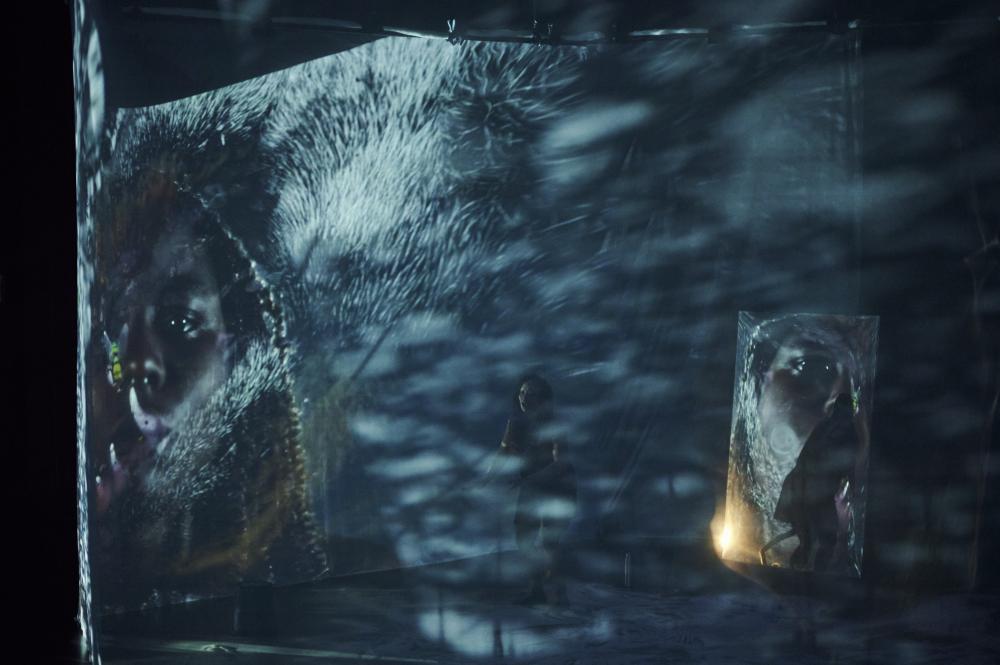A deeply personal odyssey
Fatima-Zohra El Maâti watches Khadija El Kharraz Alami
Fatima-Zohra Ait El Maâti attended a rehearsal of Khadija El Kharraz Alami's ENSEMBLE PIECE and spoke to her about what she saw. Read the interview here.
In a realm that blurs the boundaries of imagination and reality, Khadija El Kharraz Alami beckons us to embark on a journey alongside the tribe Hayawan (creatures) el Ghoul (evil spirit) Shjema T'wila (high trees). Taking place in a living tapestry signed by Hussein Shikha, this world unfolds onto the confines of a mysterious bubble. Drifting like whispers from another dimension, both distant and intimately near.
In this ethereal bubble, warm tones of Tachelhit, tongue of the Moroccan Atlas Mountains, serenade us—a yearning for love woven into the haunting words of Zina Daoudia. Here, the quest for identity transcends mere exploration; it becomes a deeply personal odyssey, a journey of repair. No longer conforming to societal moulds or bowing to imposed labels, but revelling in the authenticity of self.
“What more do I have to say? Haven't I already shared it all in my previous performances?” Khadija no longer wants to repeat herself. Instead, she uses her performance to confront these questions, as a satire, because she no longer feels the need to explain. People must embark on their own quests.
On her quest, she immersed herself in residencies across Morocco. El Kharraz Alami is on a passage, not to mimic traditions and customs, but for them to flow through her body, mind, soul, and spirit. Success and failure take a backseat; it's about the transformative journey itself. Her voyage of self-discovery led her to explore her family history, unraveling her connection to the indigenous Amazigh community. Instead of hasty judgements, she allowed layers to emerge naturally, peeling back the surface to discover the plurality within.
Though she spent time in Morocco while preparing for Now I am Medea, she now describes that period as “naïve and untainted, more unformed”. Today, she possesses a social network formed through her extended stays, allowing her to forge a deeper connection. “It's not about finding answers but coming to terms with the questions,” a journey marked by acceptance rather than struggle.
That acceptance was woven into an exploration of the Gnawa traditions, and her time spent in the Sahara, which challenged prevailing notions about jinns. Moving cautiously, observing, absorbing, and gradually letting us in on her discoveries. Transcendental rituals left a profound impact on her, offering healing and acceptance. In her past, 'Gnawia' (a woman practising Gnawa) symbolized everything she wasn't allowed to be, a playful spirit with wild hair and bare feet. Yet, she clung to that word.
Once known for her fiery, defiant creations, El Kharraz Alami now seeks a gentler path, not for the audience's sake, but for her own. She contemplates, “Can I still love those who perpetuate injustice?” In a whimsical twist, she decapitates an audience member at the culmination of her performance, wielding satire as her weapon of choice. Enveloping her audience in warmth, only to gently strip it away.
As spectators, we find ourselves peering into a realm inhabited by jinns, driven by Khadija's desire to awaken our curiosity, inviting us to peek through the window into this mysterious world. Who are they? What are we witnessing? She begins her journey within this world, isolated, detached from the audience, focusing on the 'here' of this unique dimension. Gradually, she draws us into her world, igniting our voyeuristic impulses. In her sanctuary, a secluded space where collective experiences take shape in an alternate time zone.
A moment that seeks to explore shared identities, and transcend the confines of definition. While deeply personal, it's not solely about Khadija; in fact, “I am not Khadija” is a sentiment you'll only truly grasp when spending time with Hayawan, el Ghoul, Shjema T'wila.
This world isn't entirely new; it's a rediscovery, a rekindling of her Moroccan upbringing under her grandmother's loving guidance. Khadija works intuitively, yet her intuition is unwavering and crystal clear, guiding her every step. Deeply attuned to the world around her, her art reflects this powerful sensitivity.
Text by Fatima-Zohra Ait El Maâti, commissioned by DE SINGEL.
